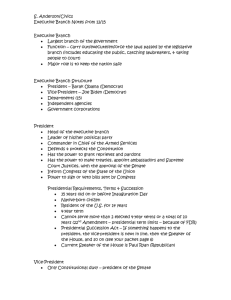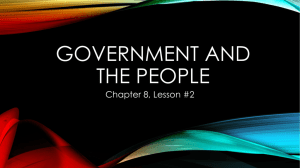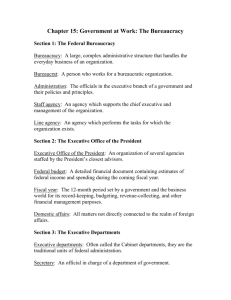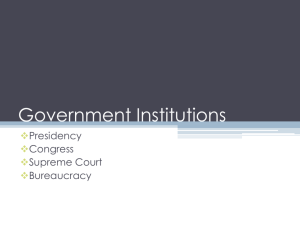The Presidency
advertisement
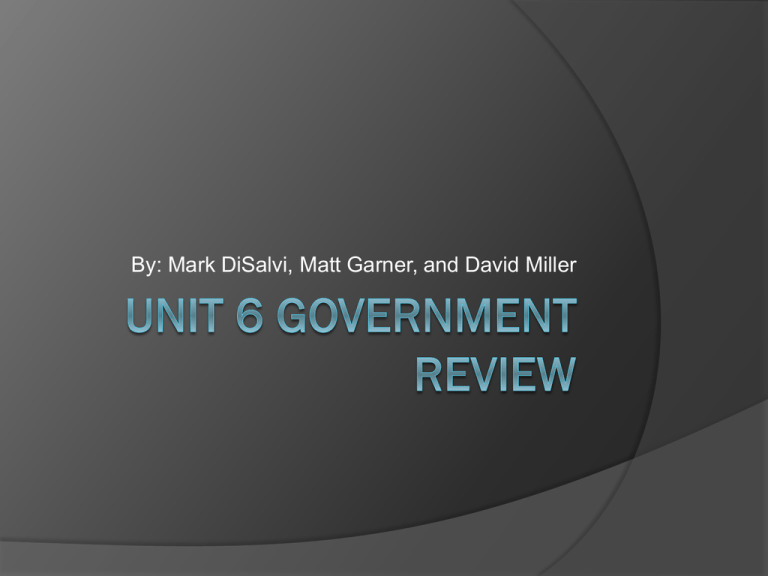
By: Mark DiSalvi, Matt Garner, and David Miller Powers of the President Formal Powers (Powers specially defined in Article II of the Constitution) Commander-in-chief Appointment of Supreme Court Justices Executive clemency (pardoning of criminals) Foreign affairs Veto Emergency powers(can use full force of military without congressional approval). Informal Powers (Powers that are not specified but given by the people and other government branches) Executive Orders (has to be constitutional and be in the president’s jurisdiction) Executive Agreement (An unofficial foreign treaty) Party Leader The President’s Roles Chief of State – symbolic leader of the country Chief Executive – Executes the laws, appoints federal officials Commander in Chief – Commands armed forces Chief Diplomat – In charge of foreign affairs Chief Legislator – Signs or vetoes legislation, writes legislation, helps create the federal budget Presidential Advisors White House Staff Unofficial cabinet Head is called White House Chief of Staff This staff contains the president’s closest friends and most trusted advisors Cabinet President can appoint cabinet members but congress must accept them with a majority vote Congress determines which cabinet positions exist President can fire cabinet members at will Some of the cabinet positions include: ○ ○ ○ ○ ○ ○ ○ ○ ○ ○ ○ ○ ○ ○ ○ Secretary of State Secretary of the Treasury Secretary of Defense Attorney General Secretary of the Interior Secretary of Agriculture Secretary of Commerce Secretary of Labor Secretary of Health and Human Services Secretary of Housing and Urban Development Secretary of Transportation Secretary of Energy Secretary of Education Secretary of Veterans’ Affairs Secretary of Homeland Security Process of Becoming President Presidents must meet these criteria to run for office: At least 35 years old Resident of United States for at least 14 years Natural-born citizen How presidents campaign for office Major parties select their presidential nominee at their national conventions The presidential candidate chooses a running mate who will become vice president The presidential candidate tries to win a majority of the electoral college by focusing on swing states and states worth a high number of votes Presidential Succession If the president dies or becomes unable to fulfill his duties the person below him takes office: ○ ○ ○ ○ Vice President Speaker of the House President Pro Tempore of the Senate Cabinet members in order of power (how they are listed on that slide) Process of Impeaching Presidents In House of Representatives The House Judiciary Committee decides whether to start the process The House is called to vote on each Article of Impeachment (for each crime charged) If any one crime gets a simple majority the case is tried in the Senate In the Senate The president is represented by a select group of House members who will serve as lawyers against the Chief Justice of the Supreme Court and all 100 senators acting as the jury 2/3 vote to convict The senate can also vote by a simple majority to prohibit the president from holding any public office in the future Impeachment cont. Although no president has ever been impeached, 4 have gotten very close: Andrew Johnson was impeached when Congress became unhappy with how he was handling some post-Civil War matters. Johnson was acquitted in the Senate by one vote and remained in office. John Tyler was tried to be impeached by Congress over state's rights issues, but the process failed in the House. President Richard Nixon was being tried for impeachment because of the Watergate scandal when he resigned. William J. Clinton was impeached by the House on charges of perjury and obstruction of justice in relationship to his affair with White House intern Monica Lewinsky. Clinton was acquitted by the Senate. What is a Bureaucracy A Bureaucracy is a system that organizes a large number of people who need to work together. Bureaucracy literally means “rule by desks” Roles of the Bureaucracy The job of a bureaucrat is to implement policy made by elected officials The federal bureaucracy creates rules that determine how government programs operate. Agencies of the Bureaucracy Cabinet Departments These departments are line agencies, or agencies that report directly to the president Independent Executive Agencies Do not full under the control of any one department Includes revenue agencies Independent Regulatory Agencies Enforces rules and regulations Independent of the elected parts of government Government Corporations Function like private corporations and could be fulfilled by private corporations Presidential Commissions Investigate problems in government and make recommendations to the president as to how to solve these problems How Agencies Gain Power Cabinet departments Created by Congress Members appointed by president and approved by senate Independent executive agencies Created by Congress Independent regulatory agencies Members appointed by president and approved by senate Government corporations Created by Congress Presidential commissions Appointed by Presidents How Agencies are Ended Cabinet departments Department disbanded by congress Members fired by president Independent executive agencies Department disbanded by congress Independent regulatory agencies Members replaced if engaged in illegal activities, otherwise completely independent of outside control. Government corporations Department disbanded by congress Presidential commissions Department disbanded by President Members fired by President Vocabulary Public administration - The task of running the government, and providing services through policy implementation Veto - the constitutional power of the president to send a bill back to Congress with reasons for rejecting it. Two-thirds vote in each house can override a veto. Bureaucracy - a hierarchical authority structure that uses task specialization, operates on the merit principle, and behaves with impersonality. Govern modern states. executive order - regulations originating from the executive branch. They are one method the president uses to control the bureaucracy. iron triangle - entities composed of bureaucratic agencies, interest groups, and congressional committees or subcommittees, which have dominated some areas of domestic policymaking. policy agenda - “the list of subjects or problems to which government officials, and people outside of government closely associated with those officials, are paying some serious attention…” Vocabulary independent regulatory agency - responsible for some sector of the economy, making and enforcing rules supposedly to protect the public interest. Also, judges dispute over these rules. independent executive agency - the government not accounted for by cabinet departments, independent regulatory agencies, and government corporations. Administration appointed by the president. line-item veto - president can reject a part of a bill while approving the rest; declared unconstitutional. executive agreement - agreement with another head of state not requiring approval from the Senate. executive privilege - the right of the president to withhold information from Congress or refuse to testify (limited by US v. Nixon). lame-duck period - occurs in Congress whenever one Congress meets before its successor is elected, but before the successor’s term begins. Vocabulary issue network - alliance of various interest groups and individuals who unite in order to promote a single issue in government policy. Impeachment - the political equivalent of an indictment in criminal law National Security Council - an office created in 1947 to coordinate the president’s foreign and military policy advisors. Its formal members are the president, vice-president, Secretary of State, and Secretary of Defense. Managed by the president’s national security advisor. pocket veto - takes place when Congress adjourns within 10 days of having submitted a bill to the president, who simply lets it die by neither signing it or voting. presidential coattails - situation when voters cast their ballots for congressional candidates of the president’s party because they are supporters for the president. Few races are won this way. government corporation - provides a service that could be provided by a private sector and typically charges for this service. Vocabulary standard operating procedures - better known as SOP's these procedures are used by bureaucrats to bring uniformity to complex organizations. Uniformity improves fairness and makes personnel interchangeable. administrative discretion - the authority of administrative actors to select among various response to a given problem. Discretion is greatest when routines, or standard operating procedures, do not fit a case street-level bureaucrats - phrase coined by Michael Lipsky, referring to those bureaucrats who are in constant contact with the public and have considerable administrative discretion Regulation - the use of governmental authority to control or change some practice in the private sector. Regulations pervade the daily lives of people and institution. command-and-control policy - according to Charles Schultze, the existing system of regulation whereby government tells business how to reach certain goals, checks that these commands are followed, and punishes offenders. Vocabulary incentive system - according to Charles Schultze, a more effective and efficient policy than commandand-control; in the incentive system, market-like strategies are used to manage public policy. Deregulation - the lifting of restrictions on business, industry, and professional activities for which government rules had been established and that bureaucracies had been created to administer. 22nd Amendment - Passed in 1951, the amendment that limits presidents to two terms of office or ten years 25th Amendment - Amendment that creates a chain of succession for filling in the presidential seat in case of death/incapacitation Vocabulary War Powers Resolution - President must report in writing to Congress within 48 hours after he places troops in trouble spots Congress that must then authorize the action within 60 days. If Congress does not, the president must withdraw the troops Pendleton Civil Service Act - passed in 1883, it created a federal civil service so that hiring and promotion would be based on merit rather than patronage. Hatch Act - federal law prohibiting government employees from active participation in partisan politics. Federal Election Campaign Act - A law passed in 1974 for reforming campaign finances. The act created the Federal Election Commission (FEC), provided public financing for presidential primaries and general elections, limited presidential campaign spending, required disclosure, and attempted to limit contributions Court Cases United States v. Nixon - 1974 case in which the Supreme Court unanimously held that the doctrine of executive privilege was implicit in the Constitution but could not be extended to protect documents relevant to criminal prosecutions Buckley v. Valeo - a case in which the Supreme Court of the United States upheld federal limits on campaign contributions and ruled that spending money to influence elections is a form of constitutionally protected free speech. The court also stated candidates can give unlimited amounts of money to their own campaigns
